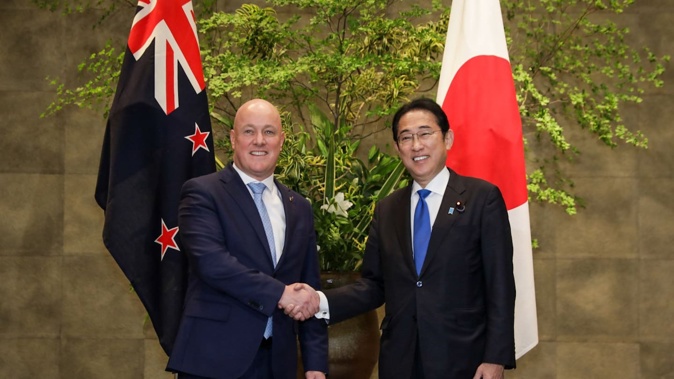
The New Zealand and Japanese governments will share more intelligence, as the countries’ prime ministers see an “increasingly challenging strategic environment in the Indo-Pacific region”.
Prime Minister Christopher Luxon and his Japanese counterpart Fumio Kishida have finalised an “Information Security Agreement”, which will enable the countries to share a wider range of top-secret information with each other.
New Zealand and Japan started looking into forming a pact in 2019, before negotiations began in 2022 when former prime minister Jacinda Ardern visited Japan.
The agreement, which is similar to that which Japan has with other countries in the Five Eyes alliance, was the centrepiece of Luxon’s meeting with Kishida in Tokyo on Wednesday evening.
The meeting followed Luxon committing to upping New Zealand’s contribution to monitoring North Korea’s compliance with United Nations sanctions, from Japan.
On Tuesday, Luxon said New Zealand would send a naval vessel to Japan in August. He made the announcement while onboard a warship at a naval base he toured.
Luxon and Kishida said in a statement they agreed to “cooperate on further bilateral and plurilateral activities and exercises, including in the area of maritime security, and to accelerate discussions on a possible acquisition and cross servicing agreement”.
Japan has such agreements with other countries, like India. They enable armies to share supplies and services.
Luxon and Kishida “strongly condemned” North Korea’s development of nuclear weapons and ballistic missiles”.
Their meeting coincided with Russian President Vladimir Putin visiting North Korea for the first time in 24 years, where he and North Korea’s Kim Jong-un signed a new co-operation agreement.
- Jenee Tibshraeny: Awkward comments from Luxon ahead of Japan trip
- 'We cannot just be an observer' - Luxon keen to up ante on defence
- Barry Soper: 'Loose lipped apprentice PM' - Fallout from Luxon's 'C-listers' clanger
Luxon and Kishida condemned, “in the strongest possible terms”, North Korea and Russia deepening their military ties.
Putin is now visiting Vietnam.
Luxon and Kishida’s statement didn’t specifically mention China, but said, the pair “expressed serious concerns over recent developments in the South China Sea and an intensification of destabilising activities”.
“The leaders opposed any unilateral actions that could escalate tensions and undermine regional stability and the international rules-based order,” the statement said.
 PM Christopher Luxon, Trade Minister Todd McClay and Japanese PM Fumio Kishida, supported by officials during a bilateral meeting in Tokyo. Photo / Nate McKinnon
PM Christopher Luxon, Trade Minister Todd McClay and Japanese PM Fumio Kishida, supported by officials during a bilateral meeting in Tokyo. Photo / Nate McKinnon
Japan is considering sanctioning companies, including Chinese firms, that are aiding Russia’s invasion of Ukraine.
Asked if he would consider sanctioning China, Luxon told media, “It’s not something we’ve discussed yet.”
However, he said he raised his concerns over the supply of weaponry to Russia with Chinese Premier Li Qiang during his visit to New Zealand last week.
Earlier on Wednesday, Luxon delivered a speech committing New Zealand to doing more to enhance security in the Indo-Pacific region.
While he hasn’t made any firm commitments to increasing how much the Government spends on defence, he said “New Zealand cannot just be an observer”.
Luxon also made the point trade and defence were closely linked, as “prosperity is only possible with security”.
“Trade flows drive our growth, support our prosperity, and enable the necessary investment in our security,” he said.
Luxon and Kishida committed to enhancing economic ties via renewable energy (geothermal and green hydrogen) for example.
They also underlined their interest in welcoming other countries to the Comprehensive and Progressive Agreement for Trans-Pacific Partnership (CPTPP).
 Prime Minister Christopher Luxon getting a tour of the Yokosuka Naval Base in Tokyo, Japan. Photo / Prime Minister's office
Prime Minister Christopher Luxon getting a tour of the Yokosuka Naval Base in Tokyo, Japan. Photo / Prime Minister's office
Victoria University of Wellington Centre for Strategic Studies director David Capie expected Luxon to come to an agreement with Kishida on intelligence sharing.
However, he characterised New Zealand’s commitment to ramping up monitoring of sanctions imposed against North Korea as “significant”.
“Along with the Red Sea deployment and an increased commitment to the UN forces in Korea, it’s another clear signal of the Government wanting to be seen to be pulling its weight in international security,” Capie said.
“The ambition for New Zealand to do more with Japan - on defence, on space, in the Pacific - makes for a striking contrast with Luxon’s language during the recent visit of the Chinese Premier, where it was almost as if New Zealand was trying to manage expectations about what might be possible to do together.”
Journalists received Government assistance for travel costs to Japan when the NZDF plane broke down in Papua New Guinea.
Jenée Tibshraeny is the Herald’s Wellington business editor, based in the Parliamentary press gallery. She specialises in government and Reserve Bank policymaking, economics and banking.
Take your Radio, Podcasts and Music with you








